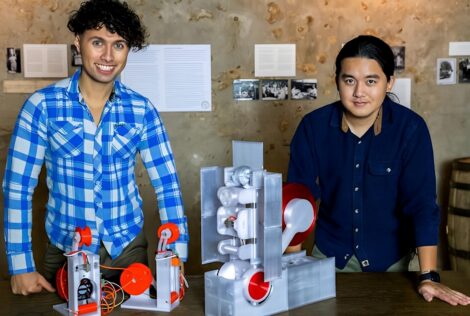

Eyeing up Matthew Sheridan’s success would make any ambitious entrepreneur green with envy. And thanks to Sheridan and his game-changing portable invention, the Nix Pro Colour Sensor, the world can now measure exactly that shade of green.
Designers can make sure it doesn’t clash with the carpet or the logo, while manufacturers can ensure perfect replication. Quality-control folks can measure the range of variation, and anyone else who cares can discover if envy is nearer to emerald, sage or lime.
The McMaster Engineering grad’s 2012 invention captures the colour of any surface and sends that info to a smart-phone app that allows users to save, share, match and compare tones.
It’s now shipping to more than 50 countries, while the lower-priced Nix Mini Colour Sensor released last summer is bringing the technology to a whole new market. Last Christmas, the gadget even made it onto GQ’s list of best technology gifts for men.
Our vision was to build something that had the accuracy of a scientific tool, but that could actually be used by an average person — a homeowner, contractor or designer.
Only six years after graduating with his degree in Mechatronics Engineering and Management, Sheridan has turned inspiration into success. His 20-employee company Nix Sensor Ltd., based out of the McMaster Innovation Park, is currently seeking a $5 million Series A from investors. The cash will allow the company to double its number of employees, in order to build more software to help people organize and share their colour and paint choices.
“We’re in the era where you can order a burrito from your phone on your couch. But paint is still four or five hours of trips back to the store, on average,” he explains. “There’s a lot of room for improvement.”
That need for improvement in the colour industry came to Sheridan years ago, as he watched his mother, an interior designer, lug around a heavy bag of colour swatches and samples.
“As an engineer, it just didn’t make any sense to me that that’s how they did it,” he says.
The idea for a low-cost portable colour sensor simmered in the back of his mind until he met a woman making custom makeup for burn victims, who also needed such a device. That opened his eyes to the potential markets for what he envisioned as a measuring tape for colour – a device that would span the gap between existing expensive scientific equipment and simply eyeballing colour.
Several prototypes later, Sheridan and his team turned to Kickstarter, which had just launched in Canada, to really evaluate the merit of his idea.
“We showed the product to strangers on the internet to see if anyone would be interested in buying it,” he says.
Turns out they were very interested. The product raised close to $70,000 in 30 days – which was twice Sheridan’s goal. And the first order of prototypes was manufactured and shipped out to supporters.
The success of the device has stunned even Sheridan, who describes it as “crazy” and “unreal” to see the product he’s manufacturing in Hamilton sell around the world. And the range of industries that care about colour has been equally astonishing to him.
While design and manufacturing industries were obvious markets, it turns out that food producers and even movie houses are using the Nix Sensor to manage quality and consistency.
Along with a degree of business success, Sheridan’s big idea has earned him a number of accolades. In 2015, he was named Ontario’s Young Entrepreneur of the Year, and later that year, recognized with the Ernest C. Manning Foundation Award of Distinction.
For ambitious young students looking to build their own entrepreneurial ideas into start-up success, he has some advice.
“Find a way to try out your idea as fast as possible and just do it,” he says. “You’ll never be right, you’ll never be even close to being right, but if you don’t try it, you’re not going to know one way or another and you won’t be able to fix what you’re wrong about.”
But, he adds, good entrepreneurs also need to adopt a testing mentality – constantly looking for and listening to feedback from those strangers to ensure potential products meet a real need. “You just keep asking questions to validate what you’re doing, like a science experiment.”
“The reality of this industry is that you’re failing all the time and what makes you a good entrepreneur is getting over that and just moving forward.”


